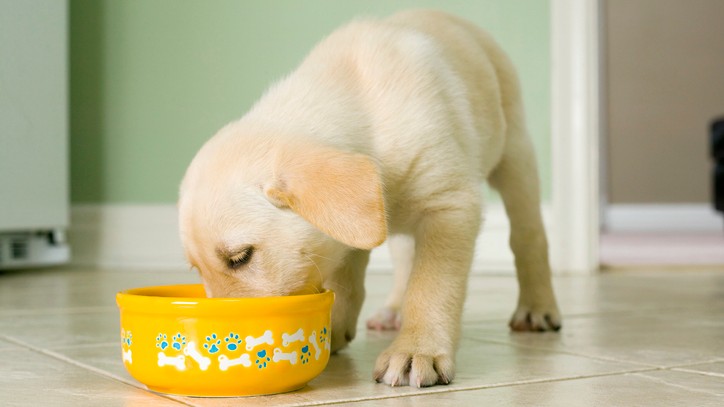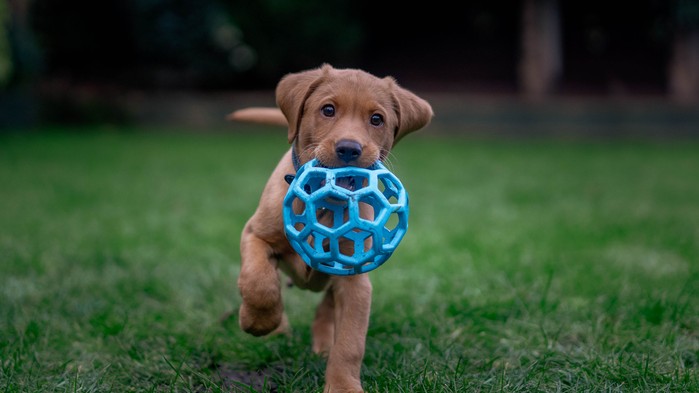How to choose puppy food: Our vet offers some advice
Before you hit the pet food aisle, check out these tips for how to choose puppy food.

Get the best advice, tips and top tech for your beloved Pets
You are now subscribed
Your newsletter sign-up was successful
Knowing how to choose puppy food is one of the most important decisions you’ll make during your puppy’s first year of life. You want to give your puppy the very best, but with so many options available in the pet food aisle – and so much confusing and often contradicting misinformation circulating about pet food – it can be really difficult to know what’s best for your pup. If you find yourself struggling to choose the best puppy diet, never fear – we’re here to help! The truth is, there’s no one diet that’s “best” for all puppies, or even all puppies of the same breed. The best diet for your puppy will depend on a number of individual factors. Read on to learn more about how you can choose a diet for your own puppy’s needs.
- Best dry dog food: Which brand of dry food is king of the kibble?
- How to make puppies sleep: 5 tips to help your puppy get through the night
- Puppy checklist: Nine ways to prepare for your new dog
- Best puppy sleep training products
The importance of puppy food
Just like growing humans, growing puppies need an appropriate balance of nutrients to support their development. Any nutrient deficiency or excess during this critical period of life can have long-lasting effects on your puppy’s health. For this reason, veterinary nutritionists recommend feeding a diet specifically formulated for puppies until your dog is fully grown. Commercially-prepared puppy foods are formulated with the correct balance of vitamins, minerals, and other nutrients that are essential to a puppy’s growth. Most dogs should eat a puppy diet until around a year of age, at which point they can be transitioned to adult dog food.
Large and giant breed dogs such as Great Danes, Rottweilers, and Bernese Mountain Dogs are particularly prone to orthopedic problems if they do not eat an appropriate diet while they are growing. In these breeds, it is especially important to provide a careful balance of protein, calcium, and phosphorous to support their growing bones and joints. Calorie restriction is also important to prevent your puppy from growing too rapidly, which can also cause orthopedic problems. Most veterinarians recommend feeding your large or giant breed puppy a commercially-prepared diet that is specifically formulated for large breeds. Large and giant breeds also take longer to finish growing, so your veterinarian may recommend feeding this diet until your dog is 12-18 months of age.
Choosing a puppy food
Puppies come in all shapes and sizes, so there’s no one puppy food that is best for all puppies. To figure out which puppy food is best for your puppy, you’ll need to consider several factors, such as:
- Your puppy’s age
- Your puppy’s breed and expected adult size
- Your puppy’s current weight and body condition
- Your puppy’s activity level
- Your puppy’s health and any genetic conditions to which he is predisposed
With these factors in mind, you’ll be able to choose a puppy food that will be best suited to your puppy’s individual needs.
Before you head to the pet store, it is also helpful to learn how to read a pet food label. There are a lot of misconceptions and tricky marketing tactics surrounding pet food, so be careful what you believe! To combat this, the World Small Animal Veterinary Association has released some helpful guides, including how to evaluate nutrition information on the internet and how to choose a pet food. These resources will help you make sure that you are choosing a reputable diet for your puppy.
When evaluating a puppy food, one of the first things you’ll want to check is that the diet is appropriate for your puppy’s species and life stage. Look on the back of the bag for the AAFCO statement, which should be in the fine print somewhere near the nutritional information. You want to choose a diet that is specifically made for growing puppies, so look for statements such as “formulated to meet the needs of growing puppies” or “meets AAFCO standards for growth”. For large breed puppies, choose a diet that specifically mentions large breeds in the AAFCO statement. Look for AAFCO statements such as “formulated for the growth and development of large breed puppies” or similar to ensure the diet you are feeding is appropriate for your pup. This is especially important for large breeds, who have different protein and mineral requirements that must be met to ensure healthy growth and development.
Get the best advice, tips and top tech for your beloved Pets
Don’t forget to ask your veterinarian for advice and recommendations! Your veterinarian can help you choose a puppy food that is best suited to your puppy’s individual needs. Your veterinarian can also help you determine how much food to feed, and can even perform a basic calorie calculation to find out how many calories your pup should be eating in a day.

Transitioning your puppy to a new diet
If you do decide to switch to a new puppy food, make sure you do so gradually. Switching foods abruptly can lead to digestive upset, including vomiting, diarrhea, and loss of appetite. You can help prevent this by transitioning to the new diet over the course of a week or two. Start by mixing your puppy’s meal as 75% of the old diet and 25% of the new diet. Feed this for a few days. If your puppy tolerates it well, you can progress to 50% of the old diet and 50% of the new diet, again feeding this for a few days and monitoring your puppy for any signs of GI upset. Finally, you can transition to 25% old diet and 75% new diet, and then to 100% of the new diet. This slow transition will ensure your puppy stays healthy and happy during the change, and he’ll learn to love his new food!
- Diarrhea in dogs: What gives dogs diarrhea and when to call the vet
Don’t forget these important aspects of puppy nutrition!
Choosing a good puppy diet is extremely important, but there’s more to feeding your puppy than just what you put in his bowl. A good nutrition plan should also include portion control, limiting the best puppy treats, and making sure your puppy gets regular exercise.
Although many puppies are natural grazers, it’s best to get into the habit of feeding your puppy regular, portioned meals early in life. Leaving food out for your puppy to snack on all day may work well while your puppy is young, but when your puppy is older this type of free feeding can lead to a lot of weight gain! Instead, offer your puppy measured portions at specific times of the day. While your puppy is young, your veterinarian may recommend feeding multiple small meals throughout the day. Once your puppy nears adulthood, you can transition to feeding 2-3 meals daily. Your veterinarian can help you determine the best feeding schedule for your puppy and can even calculate your puppy’s daily calorie requirement so you can determine how much to feed at each meal. Remember to take into account any treats, table scraps, or other food your puppy may be getting – these are a huge source of extra calories! Veterinary nutritionists recommend that you limit treats to no more than 10% of your puppy’s daily calorie intake.
Exercise is also an extremely important aspect of your puppy’s overall health. Not only is exercise a good way to vent all that puppy energy, but it’s also essential for your puppy’s growth and social development. Regular exercise and mental stimulation will go a long way towards preventing obesity and behavior problems! However, rapidly growing puppies are prone to orthopedic injuries, and too much exercise may cause problems. A good rule of thumb is that puppies should not engage in any sustained exercise beyond what they would normally do when playing with other puppies of the same age. So while it’s okay for your puppy to romp around in the park, a sustained run or hours of agility training should be avoided until your pup is fully grown.
- How much should I feed my puppy? A vet's guide
Ask your veterinarian to help you choose which puppy food is best
Ultimately, the puppy food that is best for your individual dog will depend on many different factors. The best way to choose a diet for your puppy is to consult your veterinarian for product recommendations. As your puppy grows and develops, your veterinarian can also help you adjust the diet to meet your puppy’s changing needs.
Dr. Elizabeth Racine is a small animal general practice vet covering all things pet health and wellness. Her special interests include veterinary behavior, nutrition, and internal medicine.
As a freelance writer, Dr. Racine has written content for major companies in the industry such as the American Kennel Club, Merck Animal Health, Bayer PetBasics, Elanco, and CareCredit. In her free time, Dr. Racine enjoys playing trampoline dodgeball, hiking with her beagle Dasher, and spending time with her three mischievous cats.

